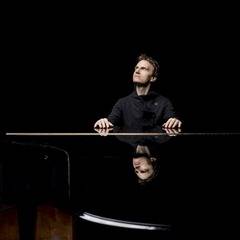|
Back
The Tone-Painter Paints New York
Zankel Hall, Carnegie Hall
03/26/2023 -
Gustav Mahler: Symphony No. 5: 4. “Adagietto” (Transcribed by Tharaud)
Franz Schubert: Impromptus, D. 899
Jean-Philippe Rameau: Nouvelles suites de pièces de clavecin: Suite in A minor: 1. Allemande”, 3. “Sarabande”, 5. “Fanfarinette” & 7. “Gavotte”
Maurice Ravel: Miroirs
Alexandre Tharaud (Pianist) 
A. Tharaud (© Marco Borggreve)
“Music, I feel, must be emotional first and intellectual second.”
Maurice Ravel
“Nature endows us with the feeling that moves us in all our musical experiences; we might call her gift instinct.”
Jean-Philippe Rameau
In a world of whirlwind pianists whose virtuosity conceals the emotional heart, the French artist Alexandre Tharaud came as a breath (and breadth) of breathless fresh air. Not that he was eccentric or idiosyncratic. But that his music created pictures, moods, virtually visual emotions. All with a delight and joy from Mr. Tharaud himself.
The recital yesterday afternoon did have–to this listener–one terrible flaw. The pianist plays his version of Gustav Mahler’s famed Adagietto at many of his recitals. And last night the audience, as do audiences around the world, relished this opening. For several reasons, I found it awful.
The Adagietto, in its original form for harp and strings, is neither a great melody, rhythmically interesting, nor inventive in development. What Mahler did produce was a sensitive, graceful delicate love letter.
Alexandre Tharaud claimed this was a “transcription”. No, this transformation was a belittlement, a negation. The original fragile color was morphed to a heavy piano overload, a whirlpool of groaning bass notes, crazy arpeggios pulling hither and thither. It was challenging to play, probably challenging to compose. But it wasn’t Mahler or Liszt. The original tints had become sooty smudges.
What followed could only be better. In fact, mightier, even epic. His Schubert Impromptus were related canvases, not mere salon pieces. In fact, they were declarations of joy and fates from the dying composer, and Mr. Tharaud brought forth the dark bass melodies under the topmost exercises.
The opening started gracefully, but the Mr. Tharaud changed moods rapidly. When he came to the third Impromptu, nothing pleasant was left. This was an understated rage.
Written the last year of his life, the same year as Winterreise, I felt this performance was like an instrumental version of disillusion from the song‑cycle: “I have said farewell to all my dreams.”
Mr. Tharaud played only four–only four!–movements from Rameau. The composer can be played gracefully, sweetly on a harpsichord. Or played on a piano with no pedaling, with a synthetic harpsichord angelic twang. Mr. Tharaud took a daring, an unheard of third course. This was Rameau on a Steinway–with no apologies.
The trills, the mordents were all present, the difficulties were très difficiles. But this was Rameau written for the 21st Century, with vibrant colors, with bold changes, with virtually an orchestral excess. I say “orchestral”, but much of it sounded as if Respighi had written Rameau for a piano, with fire and fun. And it sounded great.
In fact, the Rameau had a power that foretold Ravel’s Miroirs, the other side of Mr. Tharaud’s Gallic exuberance. Rather, the mirror‑like reflections of titles that could have come from Baudelaire. He played all five with utmost poetry. The waves crashing on the “Océan” floor, the demonic “Alborada del gracioso”, with its double‑glissandos, an homage to Ravel’s Spanish/Basque heritage. And finally the “Valley of the Bells,” a work requiring tintinnabulations and tonal artistry. As with nearly all his music yesterday, Mr. Tharaud offered music that was painting, chords which were colors.
And for the two encores? Mr. Tharaud played a Scarlatti Sonata with a whirling tempo, so it was almost unidentifiable. Second was “La Sauvage” by Rameau again, this time with savage fury. It would be unforgivable during the concert itself. But his grand playing, his ebullience and his pianistic personality allowed him, in these gifts to the full‑house audience, a celebration of the digital speed of light.
Harry Rolnick
|